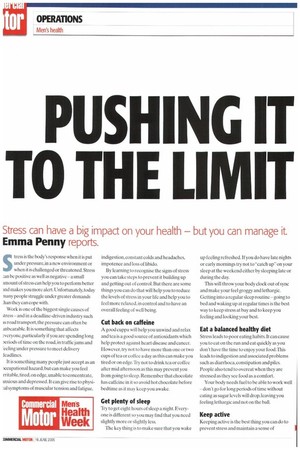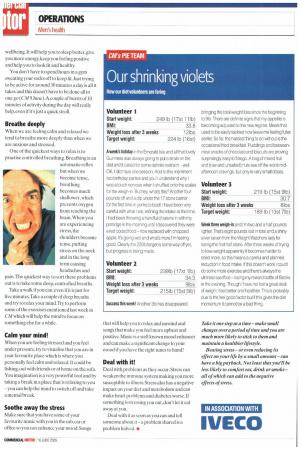PUSHING IT TO THE LIMIT
Page 60

Page 62

If you've noticed an error in this article please click here to report it so we can fix it.
Stress can have a big impact on your health — but you can manage it.
Emma Penny reports.
Stress is the body's response when it is put under pressure, in a new environment or when it is challenged or threatened. Stress an be positive as well as negative — a small amount of stress can help you to perform better and makes you more alert. Unfortunately, today -nany people struggle under greater demands .han they can cope with.
Work is one of the biggest single causes of ;tress — and in a deadline-driven industry such is road transport, the pressure can often be mbearable. It is something that affects .:veryone, particularly if you are spending long )eriods of time on the road, in traffic jams and feeling under pressure to meet delivery leadlines.
It is something many people just accept as an )ccupational hazard, but can make you feel rritable,tired, on edge, unable to concentrate, inxious and depressed. It can give rise to physi;al symptoms of muscular tension and fatigue, indigestion,constant colds and headaches, impotence and loss of libido.
By learning to recognise the signs of stress you can take steps to prevent it building up and getting out of control. But there are some things you can do that will help you to reduce the levels of stress in your life and help you to feel more relaxed, in control and to have an overall feeling of well being.
Cut back on caffeine
A good cuppa will help you unwind and relax and tea is a good source of antioxidants which help protect against heart disease and cancer. However, try not to have more than one or two cups of tea or coffee a day as this can make you tired or on edge.Try not to drink tea or coffee after mid afternoon as this may prevent you from going to sleep. Remember that chocolate has caffeine in it so avoid hot chocolate before bedtime as it may keep you awake.
Get plenty of sleep
Try to get eight hours of sleep a night. Everyone is different so you may find that you need slightly more or slightly less.
The key thing is to make sure that you wake up feeling refreshed. If you do have late nights or early mornings try not to "catch up" on your sleep at the weekend either by sleeping late or during the day.
This will throw your body clock out of sync and make your feel groggy and lethargic. Getting into a regular sleep routine — going to bed and waking up at regular times is the best way to keep stress at bay and to keep you feeling and looking your best.
Eat a balanced healthy diet
Stress leads to poor eating habits. It can cause you to eat on the run and eat quickly as you don't have the time to enjoy your food. This leads to indigestion and associated problems such as diarrhoea,constipation and piles. People also tend to overeat when they are stressed as they see food as a comfort.
Your body needs fuel to be able to work well — don't go for long periods of time without eating as sugar levels will drop, leaving you feeling lethargic and not on the ball.
Keep active
Keeping active is the best thing you can do to prevent stress and maintain a sense of wellbeing. It will help you to sleep better, give you more energy, keep you feeling positive and help you to look fit and healthy.
You don't have to spend hours in a gym sweating your socks off to keep fit.Just trying to be active for around 30 minutes a day is all it takes and this doesn't have to be done all in one go (CM9 June). A couple of bursts of 10 minutes of activity during the day will really help, even if it's just a quick stroll.
Breathe deeply
When we are feeling calm and relaxed we tend to breathe more deeply than when we are anxious and stressed.
One of the quickest ways to relax is to practise controlled breathing. Breathing is an automatic reflex but when we become tense, breathing becomes much shallower, which prevents oxygen from reaching the brain. When you are experiencing stress, the shoulders become tense, putting stress on the neck and in the long term causing headaches and pain.The quickest way to sort these problems out is to take some deep, controlled breaths.
Take a walk if you can, even if it is just for five minutes.Take a couple of deep breaths and try to relax your mind.Try to perform some of the exercises mentioned last week in CM which will help the mind to focus on something else for a while.
Calm your mind!
When you are feeling stressed and you feel under pressure, try to visualise that you are in your favourite place which is where you personally feel calm and relaxed. It could be fishing, out with friends or at home on the sofa. You imagination is a very powerful tool and by taking a break in a place that is relaxing to you you can help the mind to switch off and take a mental break.
Soothe away the stress
Make sure that you have some of your favourite music with you in the cab, car or office so you can enhance your mood. Songs that will help you to relax and unwind and songs that make you feel more upbeat and positive. Music is a well known mood enhancer and can make a significant change to your mood if you have the right tunes to hand!
Deal with it!
Deal with problems as they occur. Stress can weaken the immune system making you more susceptible to illness. Stress also has a negative impact on your diet and metabolism and can make heart problems and diabetes worse. If something is stressing you out, don't let it eat away at you.
Deal with it as soon as you can and tell someone about it a problem shared is a problem halved. • Take it one step at a timemake small changes over a period of time and you are much more likely to stick to them and maintain a healthier lifestyle.
Beating stress or even reducing its effect on your life by a small amountcan have a big payback Not least that you'll be less likely to comfort eat, drink or smoke all of which can add to the negative effects of stress.








































































































































































































